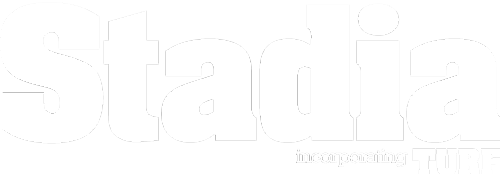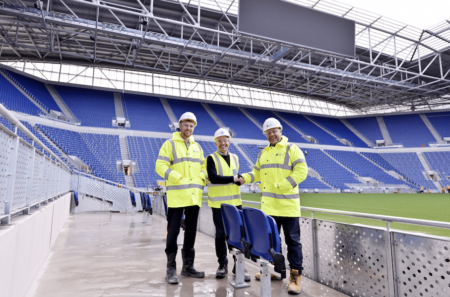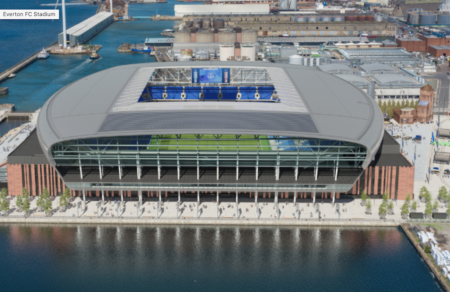A coalition of some of the world’s most prominent non-governmental organizations focused on sports and planetary health announced today that they have joined with the International WELL Building Institute (IWBI) to launch a global awareness campaign to advance health and safety practices in venues of all sizes in response to the COVID-19 pandemic.
The collaboration will benefit from the combined reach and influence of Sport and Sustainability International (SandSI), Green Sports Alliance (GSA), Sports Environment Alliance (SEA), Golf Environment Organization and EcoAthletes, who collectively include sports organization members in more than 50 countries on multiple continents. SandSI, GSA and SEA will work in concert with IWBI to promote the importance of independent assessments of health and safety measures being taken at sports venues in thousands of communities.
Recognizing that human health is inextricably linked to both the health of the planet and the strength of socio-economic institutions that support everyday life, Dr. Allen Hershkowitz, Chairman of SandSI’s Board and Environmental Science Advisor to the New York Yankees, said, “Good health and well-being are prioritized as one of the UN Sustainable Development Goals and, given the influence of sports, this can be a powerful way to highlight the impact of our buildings on our health. Addressing the pandemic from a global perspective is of the utmost importance. We need a coordinated global effort to give fans confidence that their favorite teams and venues are taking every precaution so they can feel confident returning to the stadiums and arenas.”
Accordingly, this effort is focused on encouraging all sports federations, leagues, venues and teams to enhance their venues’ health and safety protocols and assuring that those protocols are assessed by a credible third party that focuses on health and facility operations.
“We’re excited to have already in place and in market the WELL Health-Safety Rating, which has proven to be a useful tool for the more than 30 sports and entertainment facilities in the U.S. applying it, many of which have already achieved the rating,” said IWBI President and CEO Rachel Hodgdon. “We know that there are myriad league and organizational protocols that have been established and a patchwork of varying municipal, regional and national guidelines that have been laid out. But our customers needed something that could help them communicate clearly and succinctly that the health and well-being of their employees, guests and community stakeholders were the top priority and specific strategies were being implemented, built on the available science.”
Hodgdon noted that the WELL Health-Safety Rating was developed in response to acute health threats such as the COVID-19 pandemic and that it has far-reaching applicability for supporting the ongoing health and safety needs of people in a given space, during both normal operating periods and in times of emergencies.
By focusing on operational policies, maintenance protocols, emergency plans and stakeholder engagement, the rating empowers organizations to prioritize the health of their staff, visitors and stakeholders.
The WELL Health-Safety Rating has resonated since its launch. Spaces enrolled in the rating have crossed 1.7 billion square feet, spanning all industries and building types. Achieved in just 11 months, the milestone signals accelerated global adoption of strategies that use our buildings as frontline caregivers in the immediate battle against COVID-19 and helps companies move toward a long-term commitment to healthier places. As a result, adoption of all IWBI programs applying WELL Building Standard (WELL) strategies, including via pursuit of the rating or WELL Certification, now stands at nearly 2.6 billion square feet across 97 countries.
Sports organizations have been aggressively pursuing the rating. More than 30 sports and entertainment venues have enrolled in or achieved the rating since September 2020. Those that have achieved the rating include:
- Amalie Arena / Tampa Bay Lightning (NHL)
- AT&T Stadium / Dallas Cowboys (NFL)
- BB&T Center / Florida Panthers (NHL)
- Bridgestone Arena / Nashville Predators (NHL)
- Fenway Park / Boston Red Sox (MLB)
- Golden 1 Center / Sacramento Kings (NBA)
- PNC Park / Pittsburgh Pirates (MLB)
- Rocket Mortgage FieldHouse / Cleveland Cavaliers (NBA) and Cleveland Monsters (AHL)Rose Quarter Campus / Portland Trailblazers (NBA)
- Scotiabank Arena / Toronto Maple Leafs (NHL), Toronto Raptors (NBA) and Toronto Marlies (AHL)
- Spectrum Center – Charlotte Hornets (NBA)
- AT&T Center and Toyota Field / San Antonio Spurs (NBA)
- State Farm Arena / Atlanta Hawks (NBA)
- Wells Fargo Center / Philadelphia 76ers (NBA) and Philadelphia Flyers (NHL)
- Yankee Stadium / New York Yankees (MLB) & NYCFC (MLS)
Philippe Duperrex, secretary general of SandSI – Sport and Sustainability International: “Reducing the spread of the pandemic requires a massive coordination of civil society. The world aches for trusted organizations to guide us toward healthier communities, and sports can play an important role to lead by example and help inspire others.’’
Roger McClendon, executive director, Green Sports Alliance:
“The number one priority of sports teams, leagues, and venues is to get fans back in the stands safely. Helping ensure the health and wellness of employees, players, and fans within arenas and stadiums so they can confidently experience the thrill of live sports together continues to be a major focus for the Green Sports Alliance. IWBI and the WELL Health-Safety Rating are valuable resources to ensure that Green Sports Alliance members have the expert science, knowledge, tools and procedures to help provide a safer environment for everyone. I look forward to continuing to share the WELL Health-Safety program with our members as we continue our journey to safely get back in the stands to watch our favorite sports teams!”
Dr. Sheila Nguyen, executive director, Sports Environment Alliance:
“The health and well-being of our community has always been a focus for the sports industry. Enduring and learning from challenges such as COVID-19, emphasizes the fact that we must have the tools and means to be our most resilient, so we can protect the places where we play and the people who love to play sport. Initiatives such as the IWBI WELL Health-Safety Rating lead the way and help shape our understanding in this field. We are supportive of all the local and international efforts such as IWBI’s that provide health and safety options for our industry, so we can build back resilient.”
Lew Blaustein, founder, EcoAthletes:
“EcoAthletes, which inspires and coaches athletes to lead climate action, understands that climate health and public health are inextricably intertwined. That’s why we believe that sports venues can and must address COVID-19 and climate change is a must. Those stadiums and arenas that achieve the WELL Health-Safety certification Rating are on the way to doing both.”
Hershkowitz noted that the collaboration of these esteemed NGOs is critical as the world continues to respond to the devastating impacts of the pandemic. “Sporting organizations have an outsized opportunity to demonstrate best practices at scale, and to communicate those practices in ways that both educate and reassure their vast publics and we want to harness that voice,” said Hershkowitz. “We’re looking forward to rolling out the elements of the campaign in the coming weeks.” These will include toolkits for the NGOs to use to help spread the word to the venues and organizations in their memberships, and visibility for those organizations who successfully achieve the third-party rating for their efforts.





